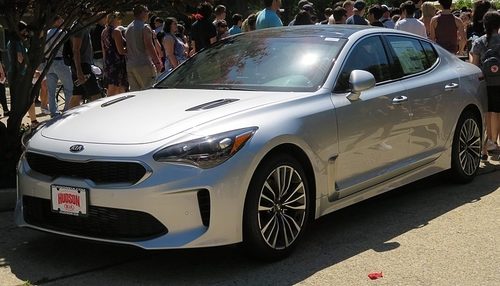Kia Stinger Lemon Law – Wiring Harness Recall
Kia Motors America will recall more than 15,000 vehicles after finding damaged wiring harnesses.
The Hyundai-owned, Irvine, Califonia-based company notified the National Highway Traffic Safety Administration (NHTSA) they will recall 16,011 2018 Kia Stinger vehicles built between July 20, 2017 and June 8, 2018.
The affected vehicles contain front wiring harnesses located in the engine and passenger compartment of the vehicle. This harness can rub against a metal burr on the left fender apron body panel. This contact can damage the wiring’s insulation, causing an electrical short and generating heat. Enough heat can damage surrounding materials and increase fire risk.
Kia’s Consumer Affairs Department first learned of a 2018 Kia Stinger fire on May 3, 2018. Kia engineers attempted to inspect the vehicle on May 18, 2018, but were rebuffed by the claimant’s attorney. Engineers finally inspected the vehicle on Sept. 6, 2018 and found the fire likely began in the engine compartment and was caused by wiring harness insulation damage.
The company inspected production lines and its records for related issues, finding the production plant changed stamping directions for the left fender apron body panel on April 5, 2018. Further testing could not replicate a fire but did confirm potential thermal damage caused by wire damage.
Kia decided on Oct. 18, 2018 to conduct a safety recall.
Kia will notify owners and dealers will inspect the wiring harness for damage. If no damage is found, a cover will be installed. If damage is found, the wiring harness will be repaired and a cover will be installed. All recall repairs are free. The recall is expected to begin December 20, 2018. Owners may contact Kia customer service at 1-800-333-4542. Kia’s number for this recall SC170. Concerned Kia owners can also visit the NHTSA’s website and enter their VIN to see if their vehicle is included in any recalls.
Your vehicle’s manufacturer is legally required to fix any recalled problems for free. If the dealership refuses to fix the part or tries to charge you for the repair, contact the manufacturer immediately. The Highway Safety Act of 1970, which created the NHTSA, requires car manufacturers to pay for the recall and replacement of a defective part.
If the manufacturer fails to repair, replace, repurchase, or provide your recalled vehicle’s loss value, they are violating the warranty and a lawyer may be able to help you. Lemon law attorneys help their clients by dealing directly with the manufacturer on the clients’ behalf, working to promptly resolve the issue and get their clients back on the road. Thanks to the Magnuson-Moss Warranty Act, attorneys can seek their fees directly from the manufacturer, meaning a client can obtain legal counsel without having to pay attorneys’ fees directly out of pocket.
LemonLawUSA.org is sponsored by Lemon Law Lawyers Allen Stewart P.C.

